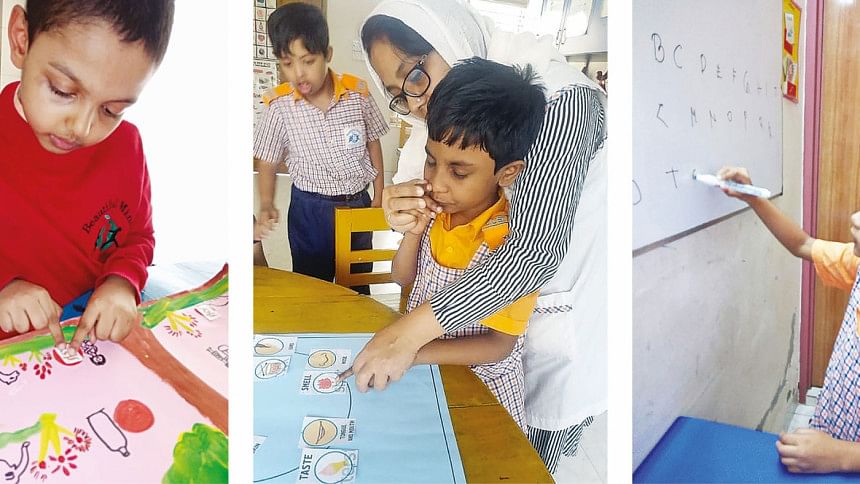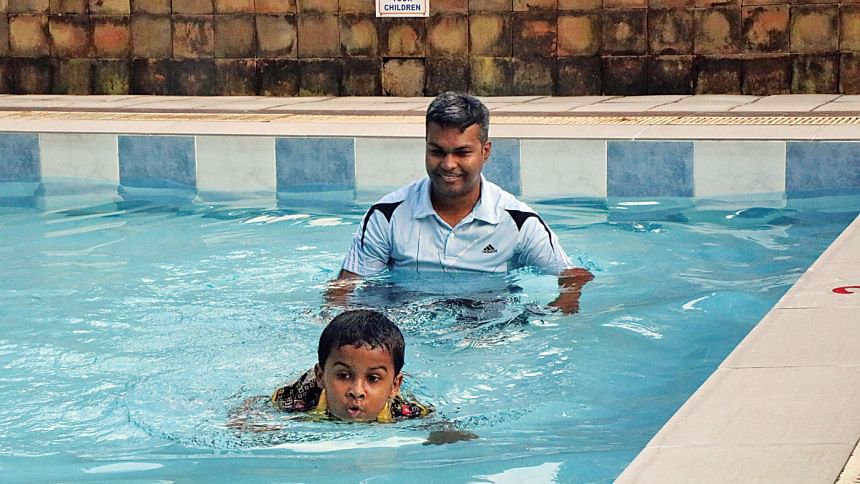Living with Autism

Six and a half year old Rayat loves throwing things from his balcony because he loves the sound of objects hitting the ground. Despite his parents' best efforts to prevent him from doing so, one day, he dropped a biscuit on a woman who was walking by their building. His dad immediately apologised to the woman but she refused to listen.
"You see, my son is a 'special' child," Rayat's dad explained.
"You think only your child is special? As if the rest of our children aren't?" the lady shot back.
What the lady did not know is that Rayat is on the autism spectrum, and is a differently abled child. Autism, as a condition, is often misunderstood in society. While some have vague or misguided ideas of the condition fueled by ignorant representations by the media and persistent social myths, others make an effort to understand the condition by lumping together all people on the spectrum into one category. However, in reality, their symptoms and conditions are far ranging. People on the spectrum can be verbal or non-verbal, high or low-functioning. Some people are born with the ability to speak but over the years their ability to do so erodes. Such has been the case with Rayat.

"Rayat loves swimming. He is hyperactive and loves to move around a lot. That translated to him becoming a good swimmer. We were all surprised. In fact, swimming helped reduce his hyperactivity. He also loves to go skating so we take him to open spaces when we can so he can skate," Rayat's father Rafiqul Islam speaks on his son's behalf.
Aymaan*, a young man at 22 years of age, has many talents. All dressed up and sitting beside his mother in their living room, Aymaan is ready and intent to tell us about his life.
"I love computers," he tells us, "I love working with them."
"We wanted him to pursue a subject which he likes," his mother explains, requesting anonymity. Aymaan is currently studying for a graphics designing diploma.
Aymaan is both verbal and high functioning, meaning one can easily converse with him. After finishing his schooling from a mainstream school, he completed his SSC and HSC from Open School, under the Bangladesh Open University. Later, he started studying for his B.A. from the same institute. Aymaan also dabbled in theatre. He completed a six-month drama training programme following which he performed a play in front of an audience alongside the rest of the troupe. He says, recounting his experience, "It felt really good to perform in front of people. Some famous actors also came out and watched the play so it was really special to get to see them.''
"He enjoyed the experience and became a part of the play but there were limitations also," his mother interjects. "He can't handle outings on his own. He used to go to classes but we don't allow him to go out alone with friends or acquaintances because we know he can't manage on his own. The people in the drama classes would hang out after class or would do street drama but he wasn't able to be a part of that."
Aymaan is also into fitness. "So maybe if graphics designing doesn't work out for him, we can think about a gym," his mother wonders.
Despite Aymaan being verbal and high functioning, he can't converse for very long, according to his mother. "He can't make friends because he can't continue a conversation for very long. He can perhaps be described as a bit 'mechanical'."
Zunaid Wasif, another bright 22-year old, joined us over a video call to share his stories. His sister tells us that Zunaid loves watching people being interviewed in the news, and that he was looking forward to this call.
"Zunaid, can you hear me?" we ask, and his face lights up as he realises he is being spoken to like they do on television. From then onwards, he speaks to us happily.
"I love cricket. I love the toss at the beginning of the match," he informs us. He also loves football and claims to be a Manchester City fan, loves going out with his family and spending time with his grandparents.
"My favourite part of the day is when I get to play video games," he says. He loves listening to the Backstreet Boys and more recently, Harry Styles. However, as for many people on the autism spectrum, communication is often a challenge. With the help of his sister, Zunaid tells us he loves cricket commentators; Harsha Bhogle is his favourite among all.
Even though these families have found a pattern to their lives by now, the journey to the present hasn't been easy. Rayat developed hearing difficulties when he was only eighteen months and then there were countless visits to doctors and therapists, both locally and overseas.
"We thought at different points that he had hearing problems and various different issues. Finally, he was diagnosed with autism. We were initially in denial. We couldn't believe our son was being diagnosed with autism. We stopped visiting our relatives as much as we did before because they didn't understand the condition and we had to think how he would behave when we went outside. His mother had to give up her career because of the level of effort it took from us," explains Rayat's father.
The period of adjustment overall is often fraught with uncertainty, stress, and fear of how others will perceive, or even accept, their child. It can even take months for the parents themselves to come to terms with their child's condition. In those times, fear and uncertainty win over love and affection.
Tasneem Chowdhury received a call from her son's school one day. After rushing to campus, she discovered what had happened. When another child tried to prevent her son Muntasin from leaving the classroom, Muntasim fought back. He was consequently labelled as a problem child and was advised to take a few days off from classes, until slowly phased out from the school.

"I don't know what my son did. Children on the spectrum don't like altercations. They don't like change. They are quite innocent," she laments. "We lived in Japan when he was really young so Muntasim got attached to that country. When we moved back, he couldn't adapt. He missed everything we left behind but he can speak Japanese well. He loves languages too and likes his dictionary."
"Our social life definitely changed after his diagnosis. Many people don't understand the condition and it is difficult to keep such children calm when we go outside. I usually explain to him in detail where we're going and who's going to be there if we go somewhere," Tasneem adds.
All these difficulties can be slightly different for a female child with autism. Eight-year old Ahona Paul is on the spectrum and while her family struggles with the relatives, education and family life, there are more concerns to add to that list.
"We want only female therapists for her. And there are fewer female therapists out there and not always close to where we live. So we frequently have to go to centers farther away to ensure it's a female therapist," says her father.
Perhaps what hurts families living with autism the most, is the behaviour of people in the society towards them.
"There are many myths in society that have to go away," says Rafiqul Islam. "People think the parents must have done something wrong in their lives and their children have become a special needs child as a result. That they are a curse. That kind of thinking is harmful."
Dr Shamim Matin Chowdhury, child and adolescent psychiatrist and founder Chairperson of "Beautiful Mind", a school for children with special needs, mentions she's seen many cases where the mother was blamed for the child's condition, becoming a victim of not just her household but her whole family. The burden of the child, the families say, must be solely on her as the "fault" is hers.
"In cases like these, I try to provide genetic counselling to both parents. However, this is only possible if the parents agree to participate," says Dr Chowdhury.
Tasneem brings to light another issue. "I have seen online and in many places people use the word 'autistic' as profanity or call each other 'autistic' without reason. This is very hurtful. Why should it become a label? What did children like my son do wrong?"
"Another issue is representation," she adds. "There are so many shows and movies on TV that are made but I have rarely seen any that include people with autism. They can easily be shown as part of a story if it is presented well. Why won't people accept them as part of a story? They are real people from society after all."
But adjusting to society's gaze isn't all there is to the family's concern. "Institutions say they have trained and experienced teachers to cater to these children, but I have witnessed the lack of their knowledge or sincerity firsthand. Many schools and institutes do a sort of business with these children and that's simply unfortunate,'' shares Samina Wasif* whose son is on the autism spectrum.
"Many schools also don't allow intellectually disabled children to continue their education. At most there would be 4 to 5 special children in a large school so they can find a way to accommodate them. Schools can make the biggest difference to a child and I have seen that with my son. He was not in a special needs school but a regular school and being there and getting along with the teachers and other students brought about a tremendous improvement in his life."
This is one of the foremost challenges institutions catering to special needs children face. Dr Chowdhury states, "Finding trained teachers is difficult and a lot of teachers have no idea about autism and its related conditions. We provide on-the-job training, but not all teachers can manage to work with children with special needs."
Children on the spectrum require a proper school providing well-rounded education, with skills training and therapy. While there are mainly a few colleges from which people can get trained as therapists, Dr Chowshury says that the number of therapists coming out is very few.
Children with autism are often left out of conversations and platforms. Their stories remain unheard of, and their lives are mostly spent within the walls of their homes. Without appropriate education and skills, they miss out on the chance to create a better life for themselves. Even though they are a part of the youth and a part of our society, we fail to include and invite them in our lives.
"We should think of it like this. The world belongs to all of us; it belongs to them just as much as it does to you," Samina tells us. "Children with autism do nothing wrong. In fact, they are far more innocent than most of us. My son never lies or tricks anyone because he simply does not know how to do something like that. He never hides anything from me, never intentionally hurts anyone because he simply cannot. So, to me, they are like angels. They are blessings."
*Names have been changed for privacy
Aliza is Matilda resurrected. Reach her at [email protected]
Mrittika Anan Rahman is a daydreamer trying hard not to run into things while walking. Find her at [email protected]

 For all latest news, follow The Daily Star's Google News channel.
For all latest news, follow The Daily Star's Google News channel. 



Comments